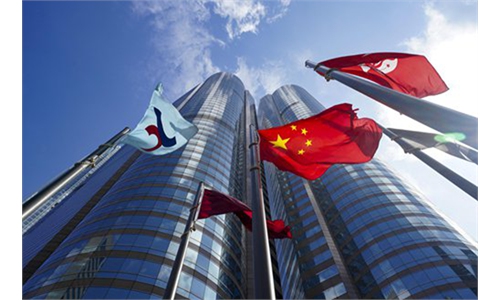HKSAR plans to widen mutual access with Chinese mainland, further optimizing wealth management products of GBA: HK finance chief

People shop and relax at Causeway Bay in Hong Kong on January 2. Photo: cnsphoto
The Hong Kong Special Administrative Region (HKSAR) plans to further widen mutual market access with the Chinese mainland, including expanding and optimizing wealth management products in the Guangdong-Hong Kong-Macao Greater Bay Area (GBA) and promoting the development of the offshore yuan business, HKSAR Financial Secretary Paul Chan Mo-po said on Wednesday.
Chan made the remarks in a speech outlining the budget plan for Hong Kong from 2023 to 2024.
According to Chan, Hong Kong will continue to explore proposals to expand mutual market access and enhance its arrangements with the mainland. In addition to enhancing the Cross-boundary Wealth Management Connect(WMC) Scheme in the GBA, the HKSAR government will also take the Bond Connect into consideration while further expanding the scope of eligible securities under the Stock Connect.
Analysts said that Hong Kong is a bridgehead for the internationalization of the yuan and the opening of China's capital markets. Stronger connections between the mainland and Hong Kong will mutually boost economic development and recovery, amid the economic siege mounted by some Western economies.
As China's economy started recovering rapidly after it optimized its COVID-19 management, Hong Kong continued to play an indispensible role in linking the mainland with the rest of the world in financial cooperation as a major global financial hub, Dong Dengxin, director of the Finance and Securities Institute of the Wuhan University of Science and Technology, told the Global Times on Wednesday.
Hong Kong also aims to elevate its international competiveness and advantages through the economic recovery of the mainland, Dong said, stressing that the solid support of the motherland will always be the source of the city's greatest core competitiveness.
The pilot program for the WMC scheme was launched in GBA on October 19, 2021. During its first year, 50,167 accounts were opened, and cross-boundary transfers reached 1.56 billion yuan ($226 million), the Xinhua News Agency reported.
Hong Kong may provide more risk management products for investors outside of the mainland, including the launch of mainland government bond futures in the city, aiming to inject new impetus into Hong Kong's capital market in a sustainable manner, according to Chan.
Some Western economies are experiencing an adjustment and may fall into a recession, so global capital and institutions are seeking a safe haven, with China being the top choice, said Dong.
Dong added that Hong Kong is a crucial conduit for overseas capital flows into China, as the nation has been continuously promoting high-quality opening-up by further optimizing relevant mechanisms.
The budget plan outlined Hong Kong's efforts to further promote the offshore yuan business. The city remains the world's largest offshore yuan hub with deposits of nearly 1 trillion yuan ($145 billion) as of the end of 2022. About 75 percent of offshore yuan settlements are conducted in Hong Kong.
A yuan-denominated counter is being explored for the Stock Connect, while Hong Kong dollar and yuan settlement options are offered by the international carbon market launched by Hong Kong Exchanges and Clearing Limited (HKEX), the operator of Hong Kong's stock exchange, Chan said.
The HKEX will introduce a dual-counter market- maker system in the first half of 2023 to promote the liquidity of yuan-denominated stocks and improve price efficiency, tie in with the setting up of yuan trading counters by issuers, and boost issues and trading of yuan-denominated securities in the city, according to Chan.


